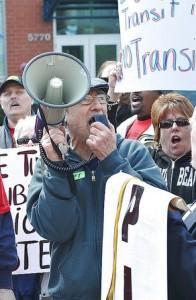Imagine, Dear Rider, that you go to your usual bus or trolley stop and find that it is strangely silent, that others have been standing for quite a while and no bus has been seen. You ask another rider who tells you that the news says that the commuter highways are jammed more than usual. Finally, you and the other regular riders walk another half mile, hoping to find other transportation.
Is it terrorism? Has someone sabotaged the transit system? Is there an unannounced strike? Shivers run through you as you contemplate life without public transit. You wonder how you will get to work and shopping. How your elderly grandmother will get to her medical appointments? How your disabled neighbor will see his friends and remain part of his already limited social circle?
And then, finally, the truth is revealed. The system is broken, the money is gone, the governments that are supposed to help have abandoned us all and said that we must find our own way around and that it’s not their responsibility to subsidize public transit.
They say that if it can’t pay for itself through your ever-increasing fares and forcing the PAT workers to work for lower pay year after year, then you should find your own way to get around in the world.
Your employer, who directly benefits from your ability to get to work using public transportation, has no sympathy and just says, “Get to work on time if you want to keep your job”.
The businesses you travel to on PAT, where you shop and increase their profits, insist that they have no responsibility to help fund public transit. They just assume you’ll find some other way to get to their store and spend your money.
Your medical providers shrug their shoulders and suggest you ask friends or relatives to haul you to your appointments.
Government environmental agencies warn of dramatically increased air pollution with 10,000 more cars stuck in traffic on the parkways and streets, with their engines idling, but say there’s nothing they can do about it.
Clearly, we are heading for disaster unless we start to realize that mass public transit meets vital needs in our society, and that it must be supported and subsidized at a level that will increase its availability and make it cheaper, not more expensive, for people to use.
Almost every time you or I ride mass transit, some corporation or business receives a hidden benefit. Public transit delivers their employees and customers to their door. It reduces traffic congestion so trucks can get through our city and suburban streets to make deliveries. Transit keeps the whole economy of our region moving so companies can do business and make money. Those same companies now need to step up now and support transit financially.
Mass public transit can no longer be viewed as a service that benefits just part of our community. It is an essential part of a healthy, functioning society and it must be improved and expanded make it available to all. Especially in a metropolitan area like Pittsburgh, transit is something we can’t do without. It must be seen as a right, not some sort of privilege that riders must buy with ever-increasing fares.
We need to organize, as riders, as commuters, as citizens, as workers, as people who care about the future of our city and believe meeting human needs should be the first priority.
Pittsburgh has been honored as one of America’s “most liveable cities.” Destroying our transit system will make this city much less liveable. It will cause severe hardship for thousands who can no longer get to their jobs, or get to grocery stores, medical care and other vital services. For the rest of us, it will mean a city with dirtier air, streets more clogged with traffic, and huge delays and hassles getting to work, to school, or anywhere else.
Pittsburghers love our sports teams, but it takes more than sports championships to attract or even keep residents and employers. We need a good mass public transit system that serves all of the people all of the time.
This is something worth fighting for. Join us, check out our website, contact us, help hand out our literature, talk to your neighbors and fellow riders. Do it now. Don’t wait for “someone else” to do it for you. You are that someone else.
Mel Packer is a physician assistant who rides PAT using his senior bus pass.
